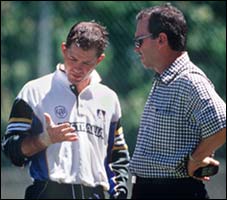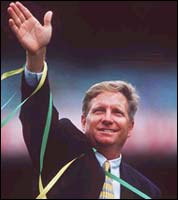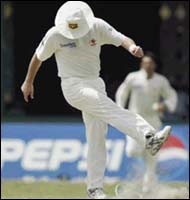A case for compassion
Daniel Laidlaw
No one can accuse Australia's selectors of being misty-eyed sentimentalists. When it comes to dropping a champion player, the panel has been far from mawkish in recent times. Whether it has been Healy, Steve Waugh as a one-day player or now Mark Waugh, they have been unforgivingly dispassionate. As selectors, nostalgia is apparently not something with which chairman Trevor Hohns and company are familiar.
 Undoubtedly, it is in neither the selectors' nor their team's best interests to retain players on the basis of past glories. The players themselves would grudgingly recognise that. And there can be little question that in an era of profitable endorsements and rich contracts, players are far more likely to over-estimate their ability to overcome age and troughs than to retire to a less lucrative lifestyle too early. It is only natural.
Undoubtedly, it is in neither the selectors' nor their team's best interests to retain players on the basis of past glories. The players themselves would grudgingly recognise that. And there can be little question that in an era of profitable endorsements and rich contracts, players are far more likely to over-estimate their ability to overcome age and troughs than to retire to a less lucrative lifestyle too early. It is only natural.
All that being said, there nevertheless remains a sense of unease in the harsh manner in which some of Australia's finest players of modern times have received their retirement notices, or what amount to them. Mark Waugh is merely the latest, and by no means most poorly treated, case. In varying ways, the list of those dispatched with less dignity than would have been ideal in the last decade includes Border, Jones, Healy, S Waugh and now M Waugh. If the players have played it hard on the field, then the selectors have certainly been no more merciful in their handling of retirements off it.
It is not the intention here to dispute the ultimate merits of any of those decisions. Indeed, the selectors' record in these cases is outstanding, and they are inured to criticism anyway. Rather, the question the dismissal of Mark Waugh again raises is whether, while still objectively picking teams on performance and considering the future, it is not possible to stage the exits of celebrated servants with a greater degree of compassion. Without distracting the focus of others, detracting from the team's interests or jeopardising the ascension of the successor, could these occasions not have been managed in a more sympathetic, dignified way?
 It's difficult to say that Adam Gilchrist's career, and Australia's fortunes after that time, would have been irreparably set back had world record-holding wicketkeeper Ian Healy been afforded a final Test in front of his home fans in 1999 (to be cynical, it could have given the ACB one more piece of framed merchandise to sell!). Steve Waugh, if the selectors had been evaluating his one-day future over a period of time, could have been informed of any concerns over form or fitness, allowing him a chance to address them (whether or not this was the case is uncertain).
It's difficult to say that Adam Gilchrist's career, and Australia's fortunes after that time, would have been irreparably set back had world record-holding wicketkeeper Ian Healy been afforded a final Test in front of his home fans in 1999 (to be cynical, it could have given the ACB one more piece of framed merchandise to sell!). Steve Waugh, if the selectors had been evaluating his one-day future over a period of time, could have been informed of any concerns over form or fitness, allowing him a chance to address them (whether or not this was the case is uncertain).
Sure, this is still a far cry from the days of senior players learning of their sacking via the radio or a phone call from the media. Times have changed, and in some parts at least it is a more professional era. However, a large part of the "professionalism", if that is the appropriate term, which characterises the Australian team is its fostering of team spirit and willingness to help and work for each other. It should not be unreasonable, then, to ask whether the same spirit could not extend to the selection committee, particularly as that committee contains Allan Border and David Boon, two players who should know what it's like to be prodded to retire before they are quite ready.
This is not to protest the Mark Waugh decision. Taking into account only Waugh's performance since the start of the previous season (and not the oft-quoted statistic of his averaging less than 35 in nine of the 12 series under his brother's captaincy), it's instructive to compare his returns over his last 12 Tests (518 runs at 30.47) to those of other Australian batsmen most recently dropped: Slater, axed in 2001, averaged 37.31 in his previous 12 Tests (albeit with discipline reportedly a factor); Langer, also last year, 46.05 (and just 13 innings removed from a run-a-ball 122 not out); Blewett, 2000, 30.50; Elliot, 1999, 31.30; Lehmann, 1998, 28.50 (just five total Tests); Ponting, 1998, 31.70; and Hayden, 1997, 21.75 (seven Tests played).
The list could go on. But clearly, if Waugh has been treated harshly, then so too have the lesser names, without receiving the same allowances for inconsistency (Elliott, Lehmann, Ponting and Hayden had all been dropped at some point during their previous 12 matches or less). This does not even count bowlers, who unless they possess Brett Lee's pace, often get judged only on one Test and are routinely yanked in and out of the side according to conditions.
 Of course, those are only statistics, and don't count Waugh's catching,
leadership, proven record and intangibles a player of his class and
experience bring to a side. On the flip side, he is also 37 and with a
limited future, unlike the younger batsmen who were dismissed and could
have, and in Langer, Ponting and Hayden's case indeed did, go on to perform superbly. On present form, those three are all better batsmen than Mark Waugh, but there was no guarantee at the time they were dropped that any of them would be picked again. They each had to go away to review and work harder at their games, something which Waugh, notable among other Australian players, was never forced to do. Be that as it may, the feeling remains the timing and sensitivity of these
decisions was not all it could have been.
Of course, those are only statistics, and don't count Waugh's catching,
leadership, proven record and intangibles a player of his class and
experience bring to a side. On the flip side, he is also 37 and with a
limited future, unlike the younger batsmen who were dismissed and could
have, and in Langer, Ponting and Hayden's case indeed did, go on to perform superbly. On present form, those three are all better batsmen than Mark Waugh, but there was no guarantee at the time they were dropped that any of them would be picked again. They each had to go away to review and work harder at their games, something which Waugh, notable among other Australian players, was never forced to do. Be that as it may, the feeling remains the timing and sensitivity of these
decisions was not all it could have been.
Having been treated leniently till this point, it would not have been
unreasonable to afford Waugh one more home series against England. Then, if he did not show improvement after three or four Tests, he could have been informed he would not be picked beyond the end of the series, announced his retirement before the last Test, and been properly saluted by his home supporters at the SCG.
Otherwise, if he was to be dropped, then it really should have been done after the South Africa series in March, when he made 169 runs at 33.80. Nothing new was really learnt or proven by the Pakistan excursion, when Waugh averaged 20. Besides, if a century in any of those Tests would have made all the difference, was the move justified in the first place? Should a decision to end a distinguished career rest on only one or two innings?
If we take Aussie selection chairman Trevor Hohns at his word, age and a desire to stagger the departures of the Waughs was not a consideration. If Steve Waugh was to retire at the end of this series or next anyway, the time between the departures of the two hardly matters. Given Australia have to some degree carried Waugh over the last season anyway and not fared too shabbily, one more series against an opponent he averaged 86 against last time, and who Australia have not lost to in 15 years, is justifiable. Then, if Steve did decide to quit at the end of the series as well, what a great occasion it might have been to farewell them both together.
Perhaps it would have been awkward for the selectors to attempt to
manufacture Mark's retirement to coincide with the end of the Ashes. They were not to know he would retire, and had he not done so it would have been like dropping him at any other time. Still, the job of selectors should reach a little further than merely picking the right team and being done with it. They decide careers, and it should be within their capacity to do so compassionately.
It's disheartening to now think that all long-serving players can probably expect to have their tenures terminated in similar fashion. One would have thought it inevitable that Steve Waugh, too, will eventually suffer the same fate, though Mark's axing has prompted him to resolve to determine his own end. Hopefully, if the selectors do find themselves forced to end the career of Steve Waugh, they will manage to do so in a more just and empathetic manner than they have in recent history.
Also read:
Mark's Gone - a photo feature
Mark Waugh quits international cricket
More Columns
Mail Daniel Laidlaw